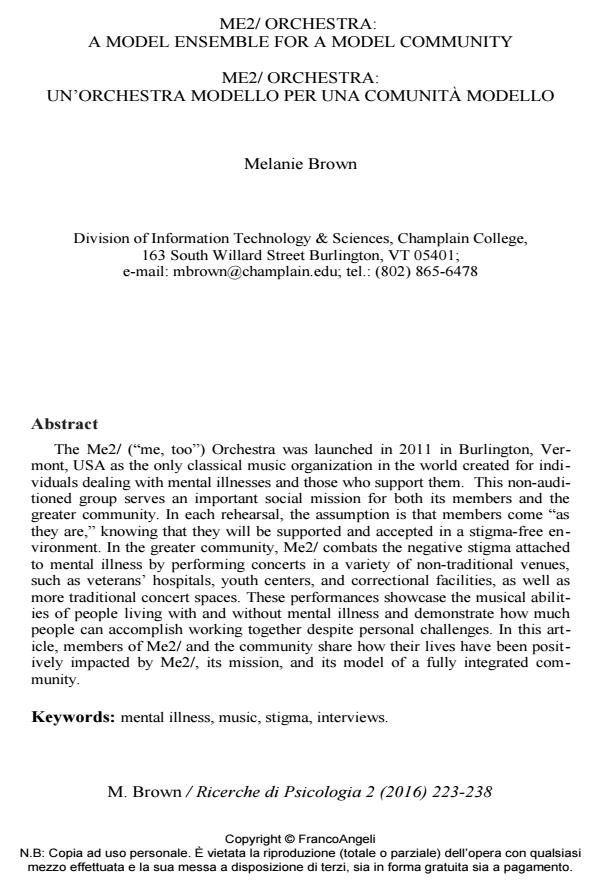ME2/ Orchestra: a model ensemble for a model community
Titolo Rivista RICERCHE DI PSICOLOGIA
Autori/Curatori Melanie Brown
Anno di pubblicazione 2016 Fascicolo 2016/2
Lingua Inglese Numero pagine 16 P. 223-238 Dimensione file 220 KB
DOI 10.3280/RIP2016-002007
Il DOI è il codice a barre della proprietà intellettuale: per saperne di più
clicca qui
Qui sotto puoi vedere in anteprima la prima pagina di questo articolo.
Se questo articolo ti interessa, lo puoi acquistare (e scaricare in formato pdf) seguendo le facili indicazioni per acquistare il download credit. Acquista Download Credits per scaricare questo Articolo in formato PDF

FrancoAngeli è membro della Publishers International Linking Association, Inc (PILA), associazione indipendente e non profit per facilitare (attraverso i servizi tecnologici implementati da CrossRef.org) l’accesso degli studiosi ai contenuti digitali nelle pubblicazioni professionali e scientifiche.
The Me2/ ("me, too") Orchestra was launched in 2011 in Burlington, Vermont, USA as the only classical music organization in the world created for individuals dealing with mental illnesses and those who support them. This non-auditioned group serves an important social mission for both its members and the greater community. In each rehearsal, the assumption is that members come "as they are" knowing that they will be supported and accepted in a stigma-free environment. In the greater community, Me2/ combats the negative stigma attached to mental illness by performing concerts in a variety of non-traditional venues, such as veterans’ hospitals, youth centers, and correctional facilities, as well as more traditional concert spaces. These performances showcase the musical abilities of people living with and without mental illness and demonstrate how much people can accomplish working together despite personal challenges. In this article, members of Me2/ and the community share how their lives have been positively impacted by Me2/, its mission, and its model of a fully integrated community.
L’orchestra Me2 ("me, too" - "anche io") è stata fondata nel 2011 a Burlington, Vermont, USA, ed è l’unica orchestra di musica classica a livello mondiale creata per individui con problemi certificati di salute mentale, e quanti vogliono supportarli. Questo gruppo, a cui si accede senza audizione, si propone una importante missione sociale, a beneficio dei membri (con e senza diagnosi) e della società intera. Si parte dal presupposto che ad ogni prova ogni membro dell’orchestra si presenterà "così com’è", con la sicurezza di essere supportato e accettato. A livello più generale, l‘orchestra si propone di combattere lo stigma attribuito alle malattie mentali, organizzando concerti in location non tradizioni, quali ospedali per veterani, centri giovanili, e riformatori, così come nei più tradizionali teatri. Questi concerti mettono in evidenza le competenze musicali di persone con problemi legati alla salute mentale, e sono anche prova di quanto individui (con e senza diagnosi) possono ottenere collaborando insieme, a prescindere dalla sfide individuali. In questo contributo, membri dell’Orchestra e della comunità che la supporta spiegano, attraverso una serie di interviste strutturate, come le loro vite sono state positivamente influenzate dall’orchestra Me2, dalla sua missione e dal suo modello di comunità integrata.
Parole chiave:Malattia mentale, musica, stigma, interviste.
Melanie Brown, ME2/ Orchestra: a model ensemble for a model community in "RICERCHE DI PSICOLOGIA " 2/2016, pp 223-238, DOI: 10.3280/RIP2016-002007